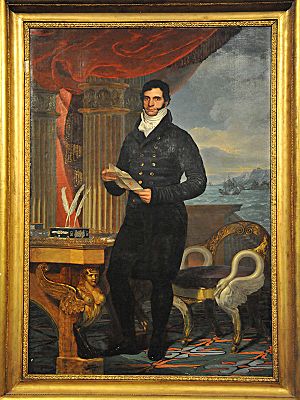Neil Campbell (British Army officer) facts for kids
Major-General Sir Neil Campbell (born May 1, 1776 – died August 14, 1827) was a brave British Army officer. He fought during the Napoleonic Wars, helped manage several British colonies, and was known for escorting Napoleon Bonaparte into exile.
Early Army Days
Neil Campbell was born on May 1, 1776. His father was also an officer in the British Army.
In 1797, Neil Campbell joined the Army as a young officer called an ensign. He was sent to serve in the Turks and Caicos Islands. In 1799, he became a lieutenant. A year later, in 1800, Campbell returned to England and joined a special group of light troops. From 1802 to 1803, he studied at the Royal Military College, Sandhurst, which was then in Great Marlow. After his studies, Campbell became an assistant quartermaster-general, helping with army supplies and movements.
In 1805, Campbell became a major in a regiment that spent two years in Jamaica. After coming back to England, he was promoted again to lieutenant colonel. Over the next three years, Campbell helped capture several islands from the French, including Martinique, the Îles des Saintes, and Guadeloupe.
Fighting in Europe
Campbell returned to Britain in 1810. In 1811, he was sent to work with the Portuguese army as a colonel, staying there until 1813. That year, he joined the Russian Army as a British military expert. He was with the Russians when they entered France in 1814. Campbell actively fought against the French. He was badly hurt on March 25, 1814, during the Battle of Fère-Champenoise. He was leading a cavalry charge when a Russian soldier accidentally thought he was a French officer. Later in 1814, Campbell became a full colonel, and in 1815, he was made a knight.
Napoleon's Exile and Waterloo
After Napoleon gave up his power in April 1814, Campbell was given an important job. He had to escort Napoleon to the island of Elba, where Napoleon would live in exile. Campbell then led the military group on Elba. The British foreign minister, Lord Castlereagh, wanted Napoleon to have complete freedom on the island.
On February 26, 1815, while Campbell was away in Italy, Napoleon escaped from Elba. Some people in England wondered if Campbell had been tricked or bribed. However, the foreign ministry did not blame Campbell at all for Napoleon's escape.
In 1815, Campbell also took part in the Waterloo Campaign, which was the final defeat of Napoleon. After the war, he commanded the occupation forces in France until 1818.
Governor of Sierra Leone
In 1825, Campbell was promoted to Major General. This meant he could apply for a higher leadership role. His first chance was to become the governor of Sierra Leone. This colony was known for being very unhealthy. Campbell's family asked him not to go because of the health risks. However, Campbell decided to take the assignment.
Sadly, on August 14, 1827, Campbell died in Sierra Leone. He was buried in the Circular Road Cemetery. A letter written in 1833 by Reverend Robert Coningham explained what happened. He said that Sir Neil Campbell died because he worked too hard and exposed himself too much before he had fully recovered from a fever. This caused him to get sick again when he was too weak to fight the illness.
 | George Robert Carruthers |
 | Patricia Bath |
 | Jan Ernst Matzeliger |
 | Alexander Miles |


